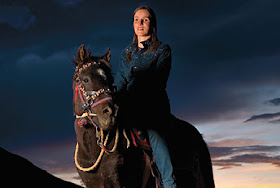.
.
You can't tell that Sabriye Tenberken is blind. She rides horses to crisscross Tibet's forbidding passes and plateaus. When talking, she looks you straight in the eye and describes things by their colors: the yellow mushrooms or the azure lake. And to greet a visitor, she bounds down a flight of steps in her boarding school for visually impaired children in Tibet's capital Lhasa. In the playground Tenberken points to 15-year-old Ngudup, who is playing a song for her on his guitar. "For 11 years," she says, "he was locked up in a dark room."
.
Tenberken, 34, has brought light into Ngudup's life and into the lives of the other 48 children at her school. She and her staff don't just teach the kids Tibetan, Chinese and English, and practical skills like making beds and operating computers. They also give their charges dignity. Because of its high-altitude exposure to the sun, Tibet has unusually high rates of eye disease, and because of the prevalence of Buddhist beliefs, blindness is often regarded as punishment for misdeeds in a previous life. When Tenberken first went to Tibet seven years ago, she discovered that Tibetans had no idea what to do with their blind children. "It was depressing," she recalls. "We met kids who had been tied to a bed for years so that they didn't hurt themselves. Some couldn't walk, because their parents hadn't taught them."
Blind from a retinal disease by the time she was 13, Tenberken, who is German, studied for a master's degree in Tibetology at Bonn University and created Tibetan braille. She applied to various nongovernmental organizations to do fieldwork, but none would give her a job. So, along with her Dutch partner, Paul Kronenberg, 35, an engineer, Tenberken headed to Lhasa, waded through reams of red tape and was finally granted permission to open her school, raising the seed money by selling her autobiography. Says Tenberken: "We want to show the kids that they don't have to be ashamed. We want them to stand up and say, 'I am blind, not stupid!' They need to be proud of themselves, gather the strength to cope with discrimination and go out there as messengers for what they've learned."
.
Tenberken's latest project is a farm some 300 kilometers from Lhasa, where blind adults are taught to raise animals and plant vegetables, and she's also establishing a center in Kerala, India, where trainees from developing countries can learn to set up similar schools. "There should be no limits for the blind," says Tenberken—clear proof that you don't need sight to have vision.
.
~ Chaim Estulin and Ursula Sautter
for Timeasia
.


